
Judy Asks: Is the Iran nuclear deal salvageable?
Probably not. Iran has warned it will violate the deal by the end of June unless the EU, Russia, and China deliver on their pledge to provide relief from US sanctions. A last-minute rescue is unlikely. The so-called special-purpose vehicle set up by France, Germany, and the UK to skirt US sanctions is not yet working. Even if it were made operational, its practical impact would be marginal because it would not cover oil sales and may itself be sanctioned by the United States.
Meanwhile, there is little sign that China and Russia are poised to take steps that could change Iranian calculations, such as enabling oil exports. For Tehran, violating the deal is a way of gaining leverage to use in future talks. Because Iran is already facing US sanctions, the prospect of additional international measures if it violates the deal is unlikely to alter Tehran’s calculations. If the deal collapses, it is possible to imagine fresh negotiations, eventually leading to a revitalized agreement.
Much depends on the degree to which Iran ramps up its nuclear activities: minor steps could leave the door open for negotiations, but major ones are likely to precipitate a further escalation in regional tensions.
Luigi Scazzieri is a research fellow at the Centre for European Reform.
